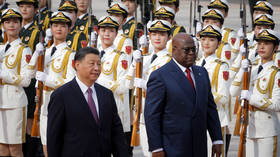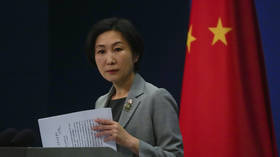Xi tells China’s security chiefs to prepare for ‘dangerous storms’

China faces increasingly difficult and complex national security challenges and must prepare for “worst-case” scenarios by increasing its capacity to deal with internal and external threats, President Xi Jinping has warned.
“We must be prepared for worst-case and extreme scenarios and be ready to withstand the major test of high winds, choppy waters and even dangerous storms,” state-run news agency Xinhua quoted Xi as saying on Tuesday in a meeting with China’s top security officials in Beijing. He added that more efforts were needed to modernize the nation’s security architecture and “get prepared for actual combat and dealing with practical problems.”
Xi made his comments to the National Security Commission amid increasing tensions with the US. Just this week, Beijing declined Washington’s request for a meeting between the two countries’ defense chiefs when both men attend a security conference in Singapore in June, citing the need for US officials to respect China’s sovereignty and security concerns.
China cut off defense and climate ties with Washington last August over alleged meddling by US officials in Taiwan. Chinese Foreign Ministry spokeswoman Mao Ning demanded on Wednesday that the US stop flying spy planes over the South China Sea, calling the flights “dangerous provocations.” Her statement came one day after the US Indo-Pacific Command accused a Chinese pilot of causing a near-collision by buzzing his fighter jet in front of an American reconnaissance plane in international airspace above the South China Sea.
The Pentagon has labeled China “the most consequential and systemic challenge” to US national security – an assessment that Beijing derided as an excuse to expand Washington’s nuclear arsenal and maintain its military hegemony.
Xi urged his security chiefs to build up “strategic self-confidence,” improve the coordination of their operations and utilize more advanced technology. He called for enhanced real-time monitoring of security threats, a better early warning system and improved handling of computer data and artificial intelligence (AI).
“The complexity and severity of national security problems faced by our country have increased dramatically,” Xi said.
US President Joe Biden’s administration has tried to stymie China’s development of advanced semiconductor chips, at least partly because of their importance in advancing AI technology. Those measures have included restrictions on exports of semiconductors and advanced chip-making equipment to China.
Last week, China banned purchases of products from Micron Technology, the largest US maker of computer memory chips, citing “significant security risks.” Some observers interpreted the move as retaliation for Washington’s efforts to contain China’s chipmaking industry. US Secretary of Commerce Gina Raimondo responded by saying Washington “won’t tolerate” the Micron ban.














